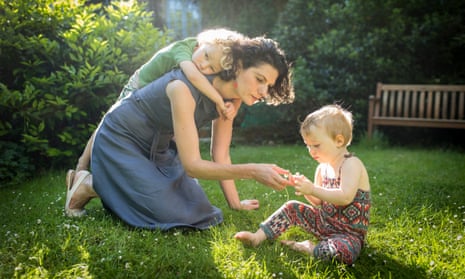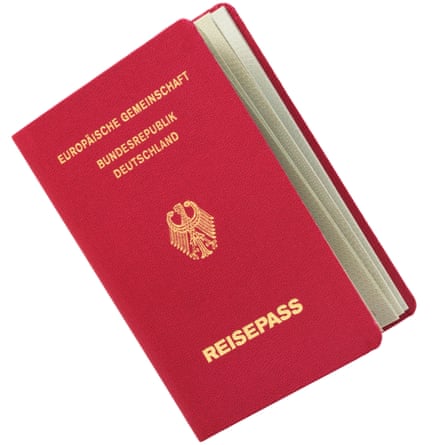

Why I’m making my family German
source link: https://www.theguardian.com/lifeandstyle/2017/jun/03/why-im-making-my-family-german
Go to the source link to view the article. You can view the picture content, updated content and better typesetting reading experience. If the link is broken, please click the button below to view the snapshot at that time.
Why I’m making my family German
Deeply unhappy at the EU referendum result last June, Amelia Hill applied for dual nationality for her and her children – returning to the German roots that her grandparents fled from during the 1930s

Last week, I celebrated my daughter’s second birthday by making her German. Instead of eating birthday cake and pulling party poppers, she spent the day twirling round various waiting rooms at the German embassy in London, as I put the finishing touches to sheaves of paperwork, eventually collecting her dual-nationality certificate and her new German passport.
It was more joyous than it sounds. The visit was the culmination of a process I began the day of the EU referendum result last June: getting dual nationality for my children (now two and four) and for me under Germany’s restored citizenship application law – a right reserved for anybody who was persecuted on political, racial or religious grounds during the Nazi dictatorship, as well as their descendants.
My culturally but non-religiously Jewish grandfather fled the Nazis with my non-Jewish grandmother, just as war was breaking out. Not all of the family were so fortunate, but those who were, found refuge in Britain. I wasn’t brought up to be ashamed – or proud – of my German heritage. I wasn’t brought up to consider myself anything other than British and Christian. I never dreamed of seeking dual nationality. The idea, had it ever even occurred to me, would have seemed unnecessary and slightly dishonest, so entirely British as I have always felt.
But that was before the result of the referendum. As a passionate member of the 48%, I felt a dramatic and unexpected crumbling of my British identity. I found I identified as a Londoner – a city where the vote to remain in the EU hit 60% (in some areas, the remain vote was more than 70%) – but as to the rest of the country: it suddenly felt like a foreign land that I didn’t understand and in which I was not welcome.
It seemed like a bit of a joke at first. “I’m making my family German,” I would announce to friends in glee, delighting in their surprise and interest. My enthusiasm motivated my mother to apply for her own dual citizenship. The paperwork for my five-year-old nephew is almost ready to be submitted for his own certificate and passport. But it seemed too far-fetched to take seriously: I couldn’t quite believe we would be accepted, despite our cultural right to be.
I wasn’t alone in my somewhat kneejerk reaction to the referendum result. In October, German authorities were reporting a twentyfold increase in the number of restored citizenship applications. About 400 applications from the UK were being processed by the authorities and 100 further inquiries that would “very probably” lead to applications were said to be in the pipeline. The usual annual figure is about 25.
Michael Newman, the chairman of the Association of Jewish Refugees, who has submitted his own application, said at the time that it was “somewhat ironic that we [the association] were founded partly to help people become naturalised British after the war and, 70 years on, we find ourselves in the position of assisting people who want to acquire German and Austrian citizenship because of the recent developments in Britain”.
In the face of such an onslaught of interest, I was warned that a decision on our applications could take a year or more. Nevertheless, within days of submitting our paperwork, I had a charming email from a named contact at the German embassy who stayed in touch throughout, answering my numerous (and occasionally anxious) emails swiftly, kindly and thoughtfully over the coming months.

Then just after New Year’s Day, five months after I submitted the paperwork, she sent me a personal email of congratulations: our application had been accepted. All my (English) husband and I needed to do, she wrote, was turn up at the embassy, sign a few forms and we could collect our children’s and my own dual-nationality certificates, and order our German ID cards and new passports. She was, she added, looking forward to meeting us.
For some reason, however, I dragged my heels when it came to the final step in altering my nationality and that of my children. Now that I knew it was really possible, I felt oddly anxious about it: I was British through and through, I reasoned. Perhaps this was a vanity project that had got out of hand?
But then the political landscape continued to darken: Theresa May’s extreme version of Brexit became increasingly and sickeningly clear, with announcements showcasing delusional beliefs, wishful thinking and ignorance. Jeremy Corbyn failed to hold her to account – on behalf not just of the 48% but of the 100% whom I believe are being plunged into an avoidable strategic, economic and human morass without being honestly told what they are getting themselves into – and failed to forge a Brexit plan of his own. All of which feels to me like a betrayal of the democratic right of almost half the country to have their views respected and reflected by their government.
With astonishing speed, I found I barely even felt like a Londoner. I was used to feeling frustrated and angered by my government but not disgusted and utterly alienated by both it and the opposition. And I certainly wasn’t used to feeling scared of the future or that my country was irrevocably fractured and broken. But I did – and I still do. I feel our defunct and failed constitution has proven itself to be unfit for the modern age. And yet there is little chance of it being changed: our first-past-the-post voting system, a blunt and undemocratic system that utterly fails to reflect the true view of the electorate, means winner takes all – and keeps it.
And so last week we trooped across town to Belgravia in the spring sunshine, put pen to paper and made the irrevocable leap.
I wasn’t used to feeling scared of the future or that my country was irrevocably fractured and broken
I assumed that I would feel that I had gained something – an extra identity – when I accepted my German nationality. But sitting with our daughter on my lap and our son on my husband’s, as the embassy official congratulated us (and advised my husband on what he should do if he wanted to apply for German citizenship on his own behalf), I suddenly felt the jigsaw pieces inside me shift. With a slight shortening of breath, I realised that I had severed something that now turned out to be core to my sense of identity. By gaining German citizenship, I no longer had an umbilical cord linking me to the island of my birth. I had cast myself adrift and could choose my new moorings.
How does that sense of loss and not-belonging make me feel? It makes me feel wide-eyed, newly hatched and excited to the point of ebullience. These feelings are not quite enough to burn off the cloud that settled over me on 24 June 2016 and has lowered there ever since, but the sense of oppression has certainly lifted.
Walking out of the embassy with our certificates, our tiny badges that show the German and British flags twined together, and my newfound right to vote in German elections was exhilarating. It is illogical, considering that I have secured rights I have always had and have not yet lost, but the knowledge that whatever happens to this country now under whatever miserable excuses for politicians we have coming to us with whatever cack-handed, dishonest plans they have for this poor island, I have options – and, most importantly, so do my children.
My children will now always have the right to study, work, live and love abroad. That can’t be taken away from them. I am incredibly proud I have given that to them. And now that I have the personal, individual right to do the same – a right that no politician can take away from me – I find my horizons widening too. I find myself imaging what it would be like if my husband and I retire to Germany. If the NHS implodes or the country sinks into a Brexit-induced quagmire – poorer, more fractured and less influential – we now have the option of moving sooner than that. Not that we would – but the fact remains, we now could.
We are no longer prisoners of a country whose politicians do not and will not, likely for a generation or more, reflect me in any shape or form. We have options.
Recommend
About Joyk
Aggregate valuable and interesting links.
Joyk means Joy of geeK
